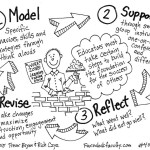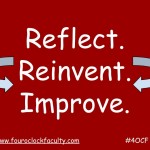I was recently listening to a podcast by author Jon Acuff, who has written a few books about his career changes and his desire to be a writer (Quitter, Start, and Do Over). During the podcast, Acuff said that he knew from the time he was in the third grade that he wanted to be a writer. Some people realize their career ambitions from a very young age. For some educators, they may decide in the third grade, just as Acuff did, that when they grow up, they plan on becoming a teacher. I was not one of those teachers. I was 23 years old before I decided that I wanted to become a teacher. I came into teaching later than most when I went back to school to get certified after I had initially gotten my degree in political science. Acuff went on to ask himself if “3rd grade Jon” would be happy knowing that he would go on to publish his third book. As I think about all the changes that have been made in education since I began my journey, I wonder if “23 year old Rich” would be happy with the decision to teach knowing what I know now.
The simple answer is yes. I will always be a teacher.
We live in a world where mandated initiatives and programs are now a part of the educational landscape However, at the heart of what I do is the belief that led me to this profession when I was 23 years old. I believe that on a daily basis, educators have the opportunity to impact students. This is a great responsibility because that impact can be positive or negative. As an educator, I believe that every decision that I make should have a positive impact on my students. As a teacher, I felt this way about the students that were sitting in my classroom, and I feel the same way now about all of the children in my district; an educator’s responsibility is to impact students positively on a daily basis.
Despite this responsibility and opportunity that is given to all teachers, not all are able to reconcile their passion with the growing changes in education. According to research, approximately 40-50 percent of new teachers will leave the profession in their first five years (http://all4ed.org/press/teacher-attrition-costs-united-states-up-to-2-2-billion-annually-says-new-alliance-report/). Some of this has been attributed to the overemphasis on testing in schools. Many teachers feel as if they are handcuffed by testing, forcing them to teach skills by a certain date, and leaving out other engaging or important activities. While there are many teachers who feel this way, there are also many others who still come to school everyday enthusiastically because their goal is to have a positive impact on students. We must continue to support those novice teachers so that they can bring their passion every day to make a difference for students.
In addition to traditional mentoring programs and services, below are several other ways that we can support our novice teachers.
Help them to establish partnerships outside of their grade level, content area, school or specialty. With traditional mentor programs, we may assign a novice teacher with a colleague who works at the same grade level or in the same content area. They may have the opportunity to meet on a weekly basis, and if lucky, on a daily basis. While this relationship can be beneficial, it is also important for a teacher to gain perspective from someone who may come from outside of their regular specialty. For much of my career, one of the colleagues that I learned the most from was an art teacher. This was because I was provided with a different perspective that helped to challenge my thinking, and helped me to see things in a different light.
Help them become a connected educator. Prior to social media, teachers connected with the other teachers in their building. If they taught a subject such as art or music, where they were the only teacher in the building in that subject area, they might meet with other art or music teachers a couple of times during the school year. Now, we have experts at our fingertips. PD from social media can be an on-demand proposition, allowing educators to learn wherever and whenever they want. Encourage novice teachers to become connected, no matter the platform, sharing resources and ideas, and learning about the latest and greatest in education.
Learn about them as a person, not just a teacher. Get to know novice teachers. Ask about their interests and lives outside of being a teacher. So many first and second year teachers dedicate themselves to their students and classroom, forgetting their outside interests. Encourage them to strike a balance between their classroom and their personal lives. Learn about what they like to do outside of school. Take a quick walk with them and share details about your personal life. Let them know that they are more than just a teacher.
Support their interests and projects. When learning about a new teacher as a person, encourage their interests. Maybe the new teacher next door takes incredible pictures on the weekend as an amateur photographer. Encourage the teacher to incorporate photography into their lesson plans or projects. This will help to engage the teacher in the work that students are doing and allow them to make a better connection with students.
Pay attention to the small details. Often the first year of teaching can be dedicated to learning to manage the position. Help novice teachers pay attention to the small details. A reminder about when that important paperwork is due might help a teacher who is disorganized. A small chocolate with a note of encouragement on a Friday after a long week can make a huge difference for a teacher who might be struggling. Don’t forget to help that novice teacher next door by remembering all of those small details!
If we can remember what is was like to be that 3rd grader who dreamed of becoming a teacher, we can help to continue to inspire the next generation of teachers. Support those novice teachers that you come in contact with. Remember that you too were once in their shoes. Remember that both of you were once third graders dreaming of what it would be like to be a teacher. Share your tips for novice teachers or your favorite story of helping a novice teacher in the comment section below.
By @RACzyz



